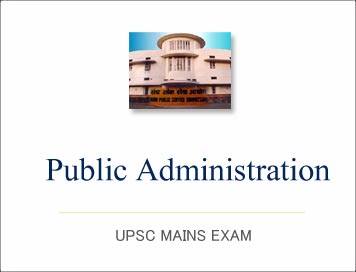Public Administration Mains 2018 : Solved Paper Public Administration : Paper-1-Question-1

Public Administration Mains 2018 : Solved Paper Question Paper-1 (Question-1)
SECTION-A
Q1. Answer the following questions in about 150 words each:
(a) "The scope of the discipline of Public Administration is determined by what an administrative system does." Does it mean that the scope of this discipline is boundaryless ? Explain. (Introduction).
ANSWER: ONLY FOR PAID MEMBERS
(b) "The concepts of rationality and efficiency are intertwined in the bureaucratic analysis of Max Weber." Comment. (Administrative Thought).
ANSWER: The rationalization process is the practical application of knowledge to achieve a desired end. It leads to efficiency, coordination, and control over both the physical and the social environment. Weber's general theory of rationalization (of which bureaucratization is but a particular case) refers to increasing human mastery over the natural and social environment. In turn, these changes in social structure have changed human character through changing values, philosophies, and beliefs. Such superstructural norms and values as individualism, efficiency, self-discipline, materialism, and calculability (all of which are subsumed under Weber's concept of zweckrational) have been encouraged by the bureaucratization process.
Bureaucracy and rationalization were rapidly replacing all other forms of organization and thought. They formed a stranglehold on all sectors of Western society: Rationalization is the most general element of Weber's theory. He identifies rationalization with an increasing division of labor, bureaucracy and mechanization .He associates it with depersonalization, oppressive routine, rising secularism, as well as being destructive of individual freedom.
(c) “New Public Service approach is an improvement over its predecessor, New Public Management." Discuss. (introduction).
ANSWER: The New Public Service (NPS) approach starts with the premise that the focus of public management should be citizens, community and civil society. In this conception the primary role of public servants is to help citizens articulate and meet their shared interests rather than to control or steer society. This is in sharp contrast to the philosophical premise of the NPM approach in which transactions between public managers and customers reflect individual self-interest and are framed by market principles. It is also distinct from the old public administration approach where citizens related to the bureaucracy as clients or constituents and were treated as passive recipients of top-down policy making and service delivery mechanisms.
The New Public Service model approaches public management from the vantage point of democratic theory, premised on the notion of an active and involved citizenship. Citizens look beyond narrow self-interest to the wider public interest and the role of public officials is to facilitate opportunities for strengthening citizen engagement in finding solutions to societal problems. Public managers need to acquire skills that go beyond capacity for controlling or steering society in pursuit of policy solutions to focus more on brokering, negotiating and resolving complex problems in partnership with citizens
(d) "A leader is a people's developer" (Napoleon). Which aspects of subordinates' development can be positively influenced by a leader ? Discuss. (Administrative Behavior)
ANSWER: ONLY FOR PAID MEMBERS
(e) “Herbert Simon's book Administrative Behavior presents a synthesis of the classical and behavioral approaches to the study of Public Administration." Explain. (Administrative Behavior)
ANSWER: The publication of Simon’s seminal work Administrative Behavior in 1947 led to provide further impetus to the behavioral movement in public administration. In this book he advocated behavioral research in administration. While highlighting “administrative behavior” Simon observed that it is “a part of the behavioral sciences and the study of public administration should involve the study of individual and collective human behavior in administrative situations”. He developed two interrelated concepts: ‘bounded rationality and satisfying’ which basically constitute the core of his entire intellectual activity. These two concepts primarily focused on the limits of human and organizational gathering and processing of information.
These ideas discarded the concept of economic man and provide impetus to the behavioral study of organizations. In his book, he makes the assumption that administration can be reduced to science ‘simply by applying logic to organization and decision making’. He maintains that to be scientific “the study of administration must exclude value-judgments, concentrate on facts, adopt clear terminology, apply rigorous analysis and tests postulates about administrative knowledge within the bounds of science and observation". He opined that behavioral approach provides the right perspective and logically clear and precise methodology to study public administration.
